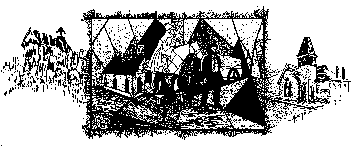In 1874, gold was discovered in the Black Hills of the Dakota Territory by George Custer’s exploring army. Mining camps sprang up overnight, drawing prospectors, speculators, rowdies, and eventually a Methodist preacher, Henry Weston Smith (1827-1876).
Smith became a Methodist preacher at the age of 23. In 1861 he enlisted in the 52nd Massachusetts Infantry; after the war, he became a doctor and moved to Louisville, Kentucky with his wife, Lydia Ann Joslin, and their four children.
Early in 1876, Smith left his home and family to join a party of “gold hunters” bound for the Black Hills. He wanted to bring the gospel to the gold mines, and he was the first preacher of any denomination to go to the Black Hills’ camps.
In May, Smith reached Deadwood, a cluster of shanties and cabins housing some three or four thousand people. Smith worked to support himself, cutting timber, building cabins, and working as a fireman in a sawmill. On Sundays, however, he preached to the miners on Deadwood’s main (and only) street, and in other mining camps.
After his Sunday morning service on August 20, 1876, Smith put a note on his cabin door:”Gone to Crook City, be back at three o’clock.” He never returned: Preacher Smith was murdered as he walked the ten miles to Crook City. He was found clutching his Bible and the blood-stained notes for the sermon he had planned to preach.
Smith may have been murdered by one of the many lawless whites in the area or by a Sioux Indian, part of the aftermath of the Battle of Little Big Horn just a few weeks before.
Smith had not been formally appointed by his church; rather, he had followed his own call to the Dakotas. In 1878, the Methodist Episcopal Church did send a missionary, James Williams, to the Deadwood area. Williams was able to organize a Methodist Society, and on March 4, 1883, First Church, Deadwood, the Mother Church of the Black Hills, was dedicated. The brand-new sanctuary was destroyed in a flood two and a half months later, but some of the furnishings were saved. A new site was selected on higher ground, at the corner of Williams and Shine, and a new building was dedicated on May 12, 1885. It was torn down in 2003, after the Deadwood and Lead United Methodist churches merged.
Points of interest at this Heritage Landmark: Visitors can see the site of the former Deadwood United Methodist Church; the grave of Preacher Smith in Mt. Moriah cemetery; the Preacher Smith monument near the place where his body was found; and the actual location of his death. Mt. Moriah Cemetery also includes the remains of Wild Bill Hickok and Calamity Jane. The Archives for the City of Deadwood holds artifacts from Preacher Smith and his family, from South Dakota Poet Laureate and Methodist Badger Clark (1883-1957), and from early Methodist churches in the Black Hills.
Special events: None at this time.
Area attractions: Deadwood is in the northern part of the Black Hills National Forest. Nearby towns are Spearfish, Sturgis, and Lead. Rapid City is to the southeast, and Mt. Rushmore and the Crazy Horse Monument are just south of Rapid City.
To visit: The location of Preacher Smith’s death is marked on highway 85 on the northern edge of the Hills and can be reached by hiking through a ranch pasture off the Crook City road, with permission from the owner. The Preacher Smith monument is along highway 85, approximately 1 1/2 miles north of Deadwood.
Location: Within the boundaries of the Dakotas Annual Conference, in Lawrence County, South Dakota. Deadwood is approximately 40 miles northwest of Rapid City.
Food and lodging: There are motels and restaurants in Deadwood, Lead, Spearfish, and Sturgis.
Directions: Take exit 17 off Interstate 90 and proceed seven miles to Deadwood, or take exit 30 off I90 and proceed twelve miles to Deadwood. The City of Deadwood Archives is located at 108 Sherman Street in Deadwood.
For further information, contact: Michael Runge, City Archivist, City of Deadwood, 108 Sherman Street, Deadwood, SD 57732, 605-578-2082; FAX: 605-578-2084; E-mail: michael.runge@cityofdeadwood.com.
To learn more about United Methodist church history in this area:
Dakotas Conference Archives, Laurie Langland, Archivist, Dakota Wesleyan University, 1200 W. University Avenue, Mitchell, SD 57301, 605-995-2134; E-mail: LaLangla@dwu.edu,
Leland D. Case, Preacher Smith, Martyr: The Story of Henry Weston Smith, Methodist, the Pioneer Preacher in the Black Hills of South Dakota (Mitchell, SD: Friends of the Middle Border, 1961).
Matthew D. Smith et al., Circuit Riders of the Middle Border: A History of Methodism in South Dakota (s.l.: s.n., 1965; Midwest Beach, printers).

